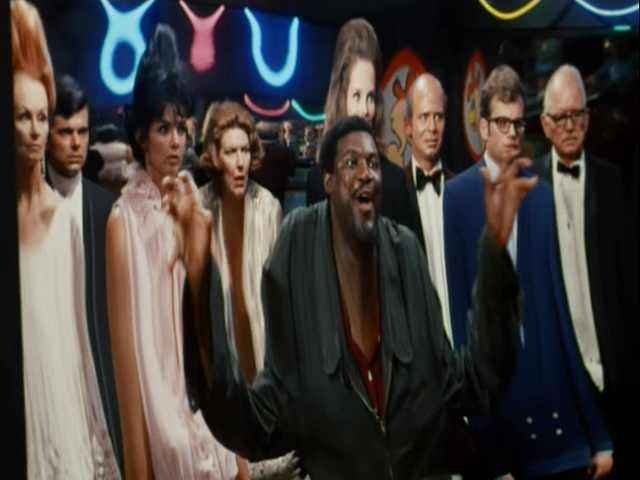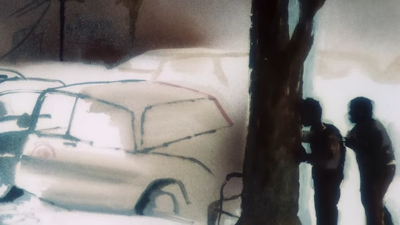Uptight 1968
Jules Dassin -- began his career as an RKO apprentice assisting Hitchcock on Mr. and Mrs. Smith (Dassin recalls Hitchcock saying "He would never print a take without shouting in my direction 'Is that all right for you?'") -- was named a communist and blacklisted from Hollywood upon which he fled and settled between France and Greece for nineteen years. Uptight (1968) is the first Hollywood film he directed after his expulsion from the States; his return was justifiably, ragingly misanthropic.
Repurposing Ford's adaptation of Liam O’Flaherty’s The Informer, Black Panther Ruby Dee co-writes the screenplay and approaches Dassin for the position of director. Lensed by Boris Kaufman, who served in the French Army against the Nazis, escaped to Canada when France fell, worked briefly with John Grierson for the NFB then moved to the United States in 1942. Gorgeous and impressionistic animations make up the opening credit sequence at the hands of John and Faith Hubley 😍, two radical filmmakers who were also disowned by studios by the House Un-American Committee. The fabric of the film is made up of outcasts, radicals, and revolutionaries.
Uptight is a perfect amalgamation of old-fashioned cinema and risky modern politics. Set in the wake of MLK's assassination, using documentary footage of the funeral procession, the sense of urgency is potent. The film is didactic and the moralizing is often clearcut and on the nose but “in these uncertain times, now more than ever” as they tend to say, there’s no time to beat around the bush. Similar in attitude to Etaix's Land of Milk and Honey, we're in states of crisis and we’re holding up mirrors to mirrors. This film is a loud and damning middle finger to the States, to McCarthy, to Law, to Order, to capitalism, to fascism, to racism and on and on it goes. This film feels like it's two different things at all times, it's a compound structure.
"As we were finishing the shoot, Dr. King was assassinated, so Jules took his cameras down to Memphis and Atlanta and incorporated some of that footage into the beginning of the film," Dee said. "We then rewrote and reshot some of the film to reflect what had just happened." MLK's assassination is the crux and SET PIECE for the entire narrative, that’s what I call filmmaking BABIE!!
The film style is remarkably old-fashioned and it's such a treat -- as if Dassin's long absence left him perhaps a little outta touch with contemporary cinematic techniques? So disorienting to see a classical 40's style morality noir littered with stalking, living, breathing shadows but set in the radical 60's; anachronism and modernity simultaneously; toeing the line of melodrama and docustyle. Pure and brutal and stylish, best suited for stage yet amplified in the kinetic way only cinema can accomplish through rhythmic choreography and surgically precise camera movements.
I like the detail of Tank sloshing through a puddle in the streets as if he's seeking out any way to punish himself.
This film simmers with a rage born out of helplessness and the frustration that crafts revolution. Tank (portrayed by Julian Mayfield, our Judas Iscariot) keeps digging himself deeper into depths of despair sprinting into rampant alcoholism with no prospect of upward mobility within a system designed to keep him down. A failed state is one that values transaction over existence. The American Empire is broken when a man steeped in poverty is pushed to betrayal for temporary financial stability.
Tank is tanked, glassy eyed and sweaty. He's wandered to the steel factory that formerly employed him for 20 years. Now he's in an arcade pointing a toy gun at a mannequin of a cowboy. Suddenly a group of white yuppies in formal wear surround him and start calling him friend. Zizek by way of Lacan might call this a fetishistic disavowal. Tank is a dime museum for these people to absolve themselves of their guilt and pat themselves on the back when deep down they're probably deeply afraid of black people. The scene descends further into madness within the mirrors, their distorted reflections not only likening Tank’s state of inebriation but the way moderates view black people in general, as oddities and entertainment.


Original artwork by production designer Alexander Trauner of the meeting in the dilapidated and abandoned bowling alley. The time for games has passed!
All moderates and neolibs, unwelcome!!! Uptight raises more questions than it attempts to answer. It doesn’t answer whether radicalized violence is better than peaceful leftism, because “better” isn’t relevant. It neither advocates nor rejects what it proposes, it simply proposes. A great example of this is when the white ally is asked to leave and claims to be "no conscience seeking liberal!” His vision is myopic and despite his best intentions he sees his involvement as virtuous in order to avoid confronting the reality that meritocracy is a sham. His involvement is a form of absolution and contrition. The liberal ego fixates on and fetishizes black struggles and at the end of the day is often a patronizing idealization. But the film doesn’t necessarily villainize him. It simply says that this isn’t his time to be on the front lines. “We either deliver ourselves, or we perish never realizing deliverance.”
Spoiler: In the end Tank throws his hands in surrender knowing his fate is inescapable--if it wasn't by gun that he'd go, it'd be by himself and a bottle sooner than later. His "resignation" allows comrades to walk away without having shed black blood. The final shot, the man laid dead against the vast wasteland of industry ends with iron ore pouring above him from an enormous piece of machinery. Buried and forgotten in the dirt--lest we forget that the blood and sweat of black men and women is literally sowed in the soil of this country! The film is a knockout and it'll leave ya with bruises.
Watch on Filmstruck while it's still there! **Seen in Theatre 1 @NWFF, After Hours







Comments
Post a Comment